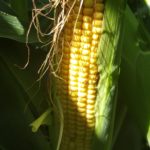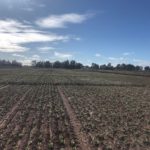OPTIMISING IRRIGATED GRAINS
Chickpeas
The GRDC Project “Development and validation of soil amelioration and agronomic practices to realise the genetic potential of grain crops grown under a high yield potential, irrigated environment in the northern and southern regions” includes 66 replicated field trials per year for 3 years. The trials cover the major irrigation types distributed across the Murrumbidgee and Murray Valleys of southern NSW, the Murray Valley of northern Victoria, south-east SA, SA/Vic Mallee and Tasmania.
Project Aim
The project aim is to evaluate crop response to agronomic practice across a range of irrigated systems and quantify yield potential in different environments (targeting >4 t/ha canola, >6 t/ha in faba bean, >10 t/ha in durum and >19 t/ha in maize).
The Chickpea trials include:
- Influence of irrigation system on chickpea performance (overhead and flood)
- Influence of different rhizobium inoculants on chickpea yield and profitability under overhead irrigation
- Influence of chickpea stubble incorporation on yield and profitability of following durum wheat
- Disease management strategies for chickpeas grown under irrigation
2020 Results
Research Results
View the research results from 2020
2020 - 2021
Key Learnings
View the key learnings from the first 2 years of the research
Trials at Kerang
The trials at the ICC site evaluate the influence of different rhizobium treatments on chickpea nodulation, dry matter, grain yield and profitability under irrigation. Watch the short video and download the fact sheet below to find out more about this work.



